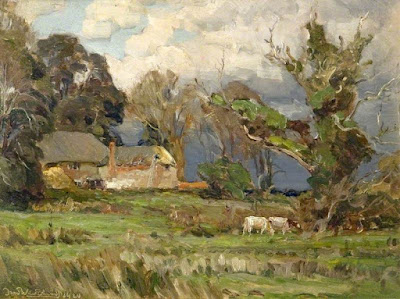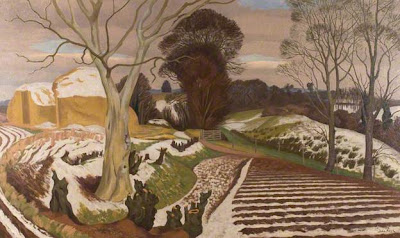My favorite poems from
The Greek Anthology are the epitaphs and the elegies. The best of them combine graceful, noble simplicity with deeply-felt, but restrained, emotion. E. K. Chambers's poem in memory of Thomasine Trenoweth, which appeared in my previous post, prompted me to return to this lovely poem by Callimachus:
Their Crethis, with her prattle and her play,
The girls of Samos often miss to-day:
Their loved workmate, with flow of merry speech,
Here sleeps the sleep that comes to all and each.
Callimachus (c. 310 B.C. - c. 240 B. C.) (translated by A. H. Bullen), in A. H. Bullen,
Weeping-Cross and Other Rimes (Sidgwick & Jackson 1921).
This four-line poem accomplishes something remarkable in a brief space: it captures the essence of Crethis, of the personality which made her belovèd among her friends; it articulates, in a non-histrionic fashion, the grief of those friends upon losing her; and, finally, it places all of this within a context which embraces each of us, and which reminds us of a reality, often avoided, that we all must come to terms with, sooner or later.
Crethis, young prattler, full of graceful play,
Vainly the maids of Samos seek all day;
Cheerfullest workmate; ever talking; -- she
Sleeps here, -- that sleep, from which none born can flee.
Callimachus (translated by "F. H."), in
The Classical Journal, Volume XXXIII (March and June, 1826), page 9.
Because I have no knowledge of Greek, I am not qualified to opine on the accuracy and fitness of the three translations that appear here. I will only note that, despite the differences in the English words chosen by each of the translators, the emotional tenor of all three versions is quite consistent: we feel the charming vivacity of Crethis, and we also feel the aching and breathless sense of absence when a bright life is cut short.
The Samian maidens oft regret their friend,
Sweet Crethis, full of play and cheer,
Whose gossip lightened toil. But here
She sleeps the sleep they all will sleep at end.
Callimachus (translated by Edward Cook), in Edward Cook, "The Charm of The Greek Anthology,"
More Literary Recreations (Macmillan 1919), page 317.
Algernon Cecil Newton (1880-1968), "The Avenue" (1944)
"All poetry is in a sense love-poetry." Edward Thomas makes this suggestion at the end of a paragraph in which, discussing the unique power of poetry, he states: "If what poets say is true and not feigning, then of how little account are our ordinary assumptions, our feigned interests, our playful and our serious pastimes spread out between birth and death. . . [Poetry] is the utterance of the human spirit when it is in touch with a world to which the affairs of 'this world' are parochial." Edward Thomas,
Feminine Influence on the Poets (Martin Secker 1910), pages 86-87.
I think that these are wonderful, and true, observations. But might it not also be said that all poems are elegies? This may be a case of six of one, half a dozen of the other: an elegy is an expression of love (a greater or a lesser love, depending upon the nature of the relationship between the elegist and the departed). There are various types and degrees of love, and the potential objects of our love are innumerable. But what all love has in common is this: the belovèd may leave us. Hence, love poems. Hence, elegies. Edward Thomas again: "
First known when lost."
The Evening Star
in memory of Catherine Mercer, 1994-96
The day we buried your two years and two months
So many crocuses and snowdrops came out for you
I tried to isolate from those galaxies one flower:
A snowdrop appeared in the sky at dayligone,
The evening star, the star in Sappho's epigram
Which brings back everything that shiny daybreak
Scatters, which brings the sheep and brings the goat
And brings the wean back home to her mammy.
Michael Longley,
The Weather in Japan (Jonathan Cape 2000). In a note, Longley explains that "dayligone" (line 4) is a "Scots (or Ulster Scots)" word which means "twilight, dusk."
Ibid, page 68.
"The evening star, the star in Sappho's epigram" likely refers to a two-line fragment by Sappho, which may be translated into prose as follows: "Evening, thou that bringest all that bright morning scattered; thou bringest the sheep, the goat, the child back to her mother." Sappho (translated by Henry Thornton Wharton), in Henry Thornton Wharton,
Sappho: Memoir, Text, Selected Renderings, and a Literal Translation (David Stott 1887), page 131.
In Greek mythology, Hesperus (Venus) is the evening star. Lord Byron adapts Sappho's lines, and links them to Hesperus, in Book III, Stanza 107, of
Don Juan:
O Hesperus! thou bringest all good things --
Home to the weary, to the hungry cheer,
To the young bird the parent's brooding wings,
The welcome stall to the o'erlaboured steer;
Whate'er of peace about our hearthstone clings,
Whate'er our household gods protect of dear,
Are gathered round us by thy look of rest;
Thou bring'st the child, too, to the mother's breast.
A. E. Housman also incorporates the spirit of Sappho's lines (and Hesperus) into the third stanza of "Epithalamium":
Happy bridegroom, Hesper brings
All desired and timely things.
All whom morning sends to roam,
Hesper loves to lead them home.
Home return who him behold,
Child to mother, sheep to fold,
Bird to nest from wandering wide:
Happy bridegroom, seek your bride.
A. E. Housman,
Last Poems (Grant Richards 1922).
Algernon Cecil Newton, "The House by the Canal" (1945)
One afternoon this past week, a heavy rain squall passed through about fifteen minutes before I headed out for my daily walk. My course took me through a long avenue of trees. By then, the sky had mostly cleared, and the green fields and bare trees glowed in the sunshine.
Wide puddles left by the just-departed storm ran continuously along both sides of the asphalt lane down which I walked. As I have noted here in the past, to see the World reflected in a puddle, however small, is a wondrous thing. But this was a replicated World of an entirely different magnitude: for two hundred yards or so the blue sky, the passing white clouds, and the intricate empty branches of the trees accompanied me, reflected in two bright ribbons of water.
As I walked, paused to gaze, and then walked on again, I was aware of the evanescence of the clear and brilliant World laid out at my feet. Ripples, moving in tiny waves from south to north, occasionally disturbed the surface of the water as the wind gusted. The blue sky and the white clouds and the tree branches reappeared when the wind subsided. This bright and haunting World came to an end when the lane came to an end. I could hear the rain water slowly gurgling into the storm drains.
"It is a commonplace of life that the greatest pleasure issues ultimately in the greatest grief. Yet why -- why is it that this child of mine, who has not tasted half the pleasures that the world has to offer, who ought, by rights, to be as fresh and green as the vigorous young needles of the everlasting pine -- why must she lie here on her deathbed, swollen with blisters, caught in the loathsome clutches of the vile god of smallpox. Being, as I am, her father, I can scarcely bear to watch her withering away -- a little more each day -- like some pure, untainted blossom that is ravished by the sudden onslaught of mud and rain.
"After two or three days, however, her blisters dried up and the scabs began to fall away -- like a hard crust of dirt that has been softened by melting snow. In our joy we made what we call a 'priest in a straw robe.' We poured hot wine ceremoniously over his body, and packed him and the god of smallpox off together. Yet our hopes proved to be vain. She grew weaker and weaker and finally, on the twenty-first of June, as the morning glories were just closing their flowers, she closed her eyes forever.
"Her mother embraced the cold body and cried bitterly. For myself, I knew well it was no use to cry, that water once flown past the bridge does not return, and blossoms that are scattered are gone beyond recall. Yet try as I would, I could not, simply could not, cut the binding cord of human love.
The world of dew
is the world of dew.
And yet, and yet -- "
Kobayashi Issa (prose translated by Nobuyuki Yuasa;
haiku translated by Robert Hass), from
A Year of My Life (1819), in Robert Hass,
The Essential Haiku: Versions of Bashō, Buson, and Issa (The Ecco Press 1994), pages 227-228.
Visiting his daughter's grave a month after her death, Issa wrote this
haiku:
Wind of autumn!
And the scarlet flowers are there
That she loved to pluck.
Kobayashi Issa (translated by Lewis Mackenzie), in Lewis Mackenzie,
The Autumn Wind: A Selection from the Poems of Issa (John Murray 1957), page 100.
Here is another translation of the same
haiku:
The red flower
you always wanted to pick --
now this autumn wind.
Kobayashi Issa (translated by Sam Hamill), in Kobayashi Issa,
The Spring of My Life and Selected Haiku (translated by Sam Hamill) (Shambhala 1997), page 78.
Algernon Cecil Newton, "Landscape"
A lovely thought by William Cowper comes to mind:
"But it is a sort of April weather life that we lead in this world. A little sunshine is generally the prelude to a storm."
William Cowper, letter to Walter Bagot (January 3, 1787), in James King and Charles Ryskamp (editors),
The Letters and Prose Writings of William Cowper, Volume III: Letters 1787-1791 (Oxford University Press 1982), pages 5-6.
Yüan Chen (779-831) wrote a series of poems after the death of his wife. This is one of them.
Bamboo Mat
I cannot bear to put away
the bamboo sleeping mat --
that first night I brought you home,
I watched you roll it out.
Yüan Chen (translated by Sam Hamill), in Sam Hamill,
Crossing the Yellow River: Three Hundred Poems from the Chinese (BOA Editions 2000), page 191.
It is often the small things that matter, and that are not forgotten, as long as we remain here. But they are not small things at all, are they?
Algernon Cecil Newton, "The Surrey Canal, Camberwell" (1935)




.jpg)









































